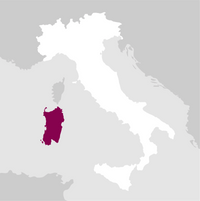Awards
Tasting notes

Perfume

Color

Taste
Serve at:
16 - 18 °C
Longevity:
05 - 10 years
Decanting time:
1 hour

- Start up year: 1949
- Oenologist: Piero Cella
- Bottles produced: 30.000
- Hectares: 20


| Name | Tenute Perda Rubia Cannonau di Sardegna Naniha 2022 |
|---|---|
| Type | Red still |
| Denomination | Cannonau di Sardegna DOC |
| Vintage | 2022 |
| Size | 0,75 l |
| Alcohol content | 14.0% by volume |
| Grape varieties | 100% Cannonau |
| Country | Italy |
| Region | Sardinia |
| Vendor | Tenute Perda Rubia |
| Story | The Naniha is obtained from cannonau on frank foot. |
| Origin | Ogliastra (Nuoro) |
| Yield per hectare | About 50 q/ha |
| Harvest | The manual harvest of the grapes takes place in the very early hours of the morning, made by a careful selection of grape ripeness, this together with the balance between the granitic soils and the hot-arid climate, are the key elements that create the merited environmental seal of Perdarubia. |
| Production technique | They are cultivated with organic methods, without the inputs of synthetic fertilizers or irrigation, solely according to traditional farming techniques. |
| Wine making | The fermentation takes place in stainless steel vats, in permanent contact with the skins for a short period of time. A gentle crushing activity ensures that only the very best of the must undergoes fermentation in temperature-controlled stainless steel tanks. The use of only the flower must reduces the yields of wine, for the benefit of the final quality. |
| Aging | Refinement also occurs is in steel for a short period in the bottle. |
| Allergens | Contains sulphites |






